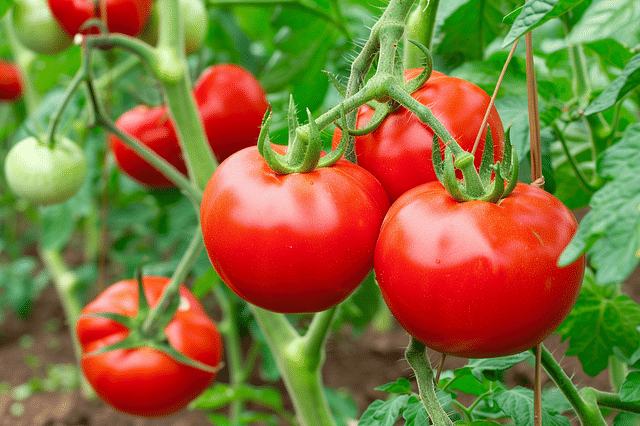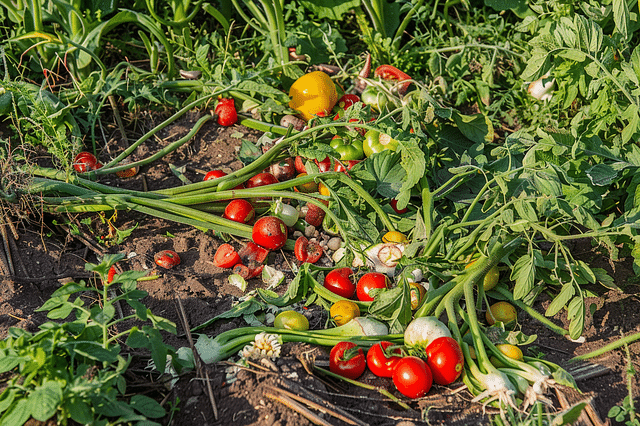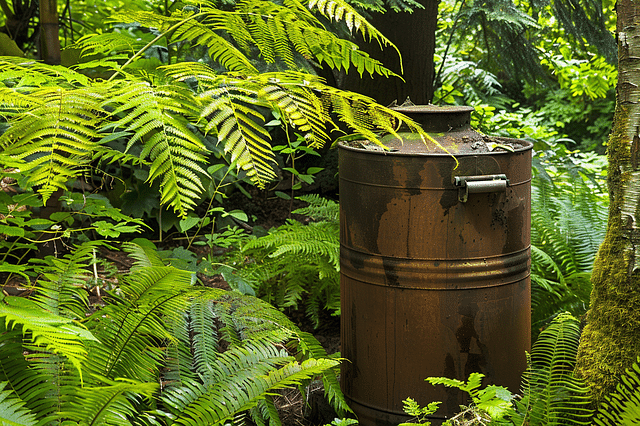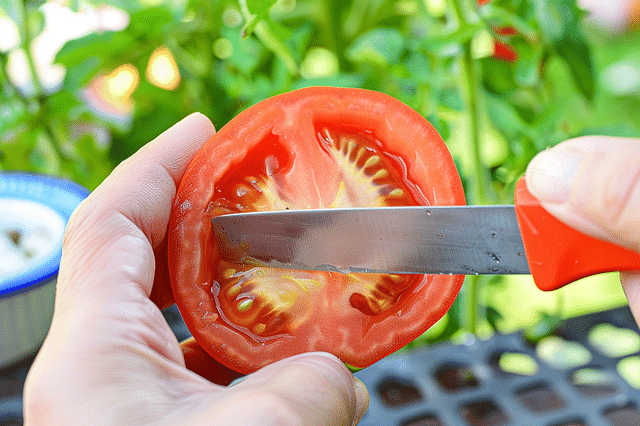Composting Tomatoes for an Eco-Friendly Soil Boost!
Discover the hidden benefits of composting tomatoes for an eco-friendly soil boost! Learn step-by-step how to compost tomatoes and enhance your harvest while contributing to a healthier environment.

Have you ever wondered what to do with all those leftover tomato scraps from your garden? Instead of tossing them in the trash, why not compost them? Composting tomatoes is not only a great way to reduce waste, but it also provides your soil with a nutrient-rich boost!
In this blog post, we'll explore the benefits of composting tomatoes and how you can easily incorporate this eco-friendly practice into your gardening routine. So, roll up your sleeves and get ready to turn those tomato scraps into fertile soil! But first, let's dive into why composting tomatoes is a fantastic idea.
Why Composting Tomatoes is Beneficial for Your Garden

Are you interested in growing luscious, flavorful tomatoes in your garden? If so, then composting tomatoes is a practice you should definitely consider. Composting is not only a great way to reduce waste and create nutrient-rich soil, but it can also have numerous benefits specifically for growing tomatoes. In this section, we will explore the various advantages of composting tomatoes and how it can contribute to a healthier and more bountiful harvest.
What are the benefits of composting tomatoes?
Composting tomatoes offers a range of benefits that can greatly enhance the overall health and productivity of your garden. Here are a few key advantages:
Improved soil structure: Adding compost to your garden beds helps improve the structure of the soil. Compost contains organic matter that loosens heavy soils and improves drainage in compacted soils. By mixing compost into the soil, you create a more favorable environment for tomato roots to grow, allowing them to access water, air, and nutrients more easily.
Nutrient-rich soil: Compost is teeming with essential nutrients, such as nitrogen, phosphorus, and potassium, that are vital for healthy plant growth. When you compost tomatoes, you are essentially recycling the nutrients from their discarded parts, such as stems and leaves, back into the soil. This nutrient boost provides tomatoes with the necessary elements they need for robust growth, vibrant foliage, and abundant fruiting.
Enhanced water retention: Compost has excellent water-holding capacity, which can be particularly beneficial for tomatoes. Tomatoes thrive in evenly moist but well-drained soil. By composting tomatoes, you increase the water-holding capacity of the soil, allowing it to retain moisture for longer periods. This can help reduce the frequency of watering, prevent water runoff, and ensure your tomato plants have a steady supply of water during hot and dry periods.
How does composting tomatoes contribute to an eco-friendly soil boost?
Composting tomatoes not only benefits your garden but also contributes to a more sustainable and eco-friendly approach to gardening. Here's how composting tomatoes can boost the health of your soil in an environmentally conscious way:
Reduces waste: Composting tomatoes allows you to recycle kitchen scraps and garden waste that would otherwise end up in the landfill. By diverting these organic materials to the compost bin, you can significantly reduce the amount of waste generated in your home. This helps reduce greenhouse gas emissions and minimizes the environmental impact associated with waste disposal.
Promotes biodiversity: Composting tomatoes supports the growth of beneficial microorganisms in the soil. These microorganisms break down organic matter and release nutrients in a form that plants can easily absorb. By encouraging the proliferation of these helpful bacteria and fungi through composting, you create a thriving ecosystem in your soil that supports healthy plant growth and promotes biodiversity.
Can composting tomatoes help improve your harvest?
Absolutely! Composting tomatoes can have a positive impact on the quality and quantity of your tomato harvest. Here's how:
Increased yield: With its nutrient-rich composition, compost provides tomatoes with the essential elements they need for optimal growth and fruit production. By incorporating compost into your garden soil, you ensure that your tomato plants have access to a steady supply of nutrients throughout the growing season. This can result in larger fruit yields and a more abundant harvest.
Improved flavor: Tomatoes grown in compost-enriched soil tend to have a more intense and flavorful taste. The organic matter in compost helps enhance the flavor profiles of fruits and vegetables, including tomatoes. The rich concentration of nutrients and the balanced soil pH achieved through composting can lead to sweeter, juicier, and more flavorful tomatoes that will delight your taste buds.
In conclusion, composting tomatoes is a win-win practice for both your garden and the environment. It enriches the soil, reduces waste, promotes biodiversity, and ultimately improves the quality and quantity of your tomato harvest. So why not give it a try and experience the incredible benefits of composting tomatoes firsthand?
Step-by-Step Guide to Composting Tomatoes

Are you looking for an eco-friendly way to dispose of your tomato waste while also producing nutrient-rich soil for your garden? Composting tomatoes is the perfect solution! In this step-by-step guide, we'll walk you through the process of composting tomatoes from start to finish.
What materials do you need for composting tomatoes?
To get started with composting tomatoes, you'll need a few key materials. Here's what you'll need:
- Tomato waste: Collect leftover tomato scraps, including peels, seeds, and pulp.
- Organic matter: Gather other organic materials like fruit and vegetable scraps, coffee grounds, tea bags, and yard waste.
- Carbon-rich materials: Collect "brown" materials such as dried leaves, straw, shredded paper, or cardboard.
- Compost bin: Choose a compost bin or container that suits your needs and available space.
- Garden fork or compost turner: These tools will help you turn and aerate your compost pile.
How to prepare tomato waste for composting?
Before adding tomato waste to your compost pile, it's important to prepare it properly. Here's what you need to do:
- Chop or shred the tomato waste: By breaking down the tomato waste into smaller pieces, you'll speed up the composting process.
- Avoid adding moldy or diseased tomatoes: These can introduce harmful pathogens to your compost pile.
- Mix the tomato waste with other organic materials: Adding a mixture of "greens" (tomato waste and other fresh organic matter) and "browns" (carbon-rich materials) will help maintain the right balance in your compost.
What other organic materials can be added to the compost?
In addition to tomato waste, there are many other organic materials you can add to your compost pile. Here are some examples:
- Fruit and vegetable scraps: Collect leftovers from your kitchen, such as carrot peels, apple cores, and banana peels.
- Coffee grounds and tea bags: These add nitrogen to your compost and help speed up the decomposition process.
- Yard waste: Grassy clippings, leaves, twigs, and small branches can all be added to your compost pile.
- Shredded paper and cardboard: These provide carbon, which helps create a balanced compost.
Remember to avoid adding meat, dairy products, oily foods, and pet waste to your compost, as they can attract pests or introduce harmful bacteria.
How to maintain the right balance of browns and greens in your compost?
Maintaining the right balance of "browns" (carbon-rich materials) and "greens" (nitrogen-rich materials) is crucial for successful composting. Here's what you need to do:
- Aim for a ratio of roughly 3 parts browns to 1 part greens. This balance provides the optimal conditions for decomposition.
- Layer or mix your browns and greens together in your compost pile. Alternate between adding layers of carbon-rich materials and nitrogen-rich materials.
- Monitor the moisture level: Your compost should be damp, like a wrung-out sponge. If it's too dry, add water. If it's too wet, add more browns to absorb excess moisture.
How to turn and aerate the compost pile?
Turning and aerating your compost pile is important to promote decomposition and prevent odors. Here's how you can do it:
- Use a garden fork or compost turner to gently mix the materials in your compost pile. This adds air and helps break down the organic matter more quickly.
- Aim to turn your compost pile every 1-2 weeks. This allows oxygen to reach the microorganisms that break down the materials.
- If you're using a compost tumbler, simply turn the tumbler to mix the contents thoroughly.
How long does it take to compost tomatoes?
The time it takes to compost tomatoes can vary depending on various factors, such as the size of your compost pile, the diversity of materials, and the environmental conditions. On average, it can take anywhere from 2 months to 1 year for tomato waste to fully compost.
To speed up the process, make sure to maintain the proper balance of browns and greens, turn and aerate the compost pile regularly, and keep it moist but not overly wet. Patience is key, and before you know it, you'll have nutrient-rich compost to use in your garden!
Tips for Enhancing the Composting Process

Composting is a fantastic way to reduce waste and create nutrient-rich soil for your garden. If you're composting tomato waste, there are a few tips you should keep in mind to ensure the process is as efficient and effective as possible. In this section, we'll explore some common questions and provide helpful tips for enhancing your composting process specifically for tomatoes.
Should you remove tomato seeds before composting?
No, you do not need to remove tomato seeds before composting them. Tomato seeds are small and will break down during the composting process. In fact, leaving the seeds in the compost can add a diversity of plant life to your garden when you use the finished compost.
Can you compost diseased or pest-infested tomatoes?
It is generally recommended to avoid composting diseased or pest-infested tomatoes. Tomatoes with diseases or pests can carry pathogens or pests that may survive the composting process and potentially infect your plants when you use the compost. Instead, it's best to discard these tomatoes in the trash or burn them to prevent the spread of diseases or pests.
Is it necessary to chop tomato waste before composting?
Chopping or breaking down tomato waste into smaller pieces can help speed up the composting process. Smaller pieces decompose faster and are easier for microorganisms to break down. If you have larger tomato waste, consider using a sharp knife or garden shears to break them into smaller chunks before adding them to your compost pile.
How to manage odor and pests in the compost pile?
To manage odor and pests in your compost pile, there are a few things you can do:
Add a balance of green and brown materials: Green materials, like fresh kitchen scraps or tomato waste, are high in nitrogen, while brown materials, like dried leaves or straw, are high in carbon. Maintaining a balance between these two types of materials can help prevent odor issues.
Turn the compost pile regularly: Turning the pile every couple of weeks helps aerate the compost and speed up the decomposition process. This can discourage pests and also reduce odor by allowing better airflow.
Avoid adding meat or dairy products: These items can attract pests and may cause unpleasant odors in your compost. Stick to plant-based kitchen scraps and yard waste.
Can you speed up the composting process for tomatoes?
Yes, you can speed up the composting process for tomatoes by making a few adjustments. Firstly, ensure that your compost pile has a good balance of green and brown materials. Secondly, provide adequate moisture to your compost pile by watering it regularly, but not to the point of creating a waterlogged environment. Lastly, turning the pile regularly will help introduce oxygen and distribute heat, both of which can accelerate decomposition.
By following these tips, you can enhance the composting process for your tomato waste and enjoy nutrient-rich compost to nourish your garden. Happy composting!
Utilizing Composted Tomatoes in Your Garden
If you're an avid gardener, you know how important it is to provide your plants with the nutrients they need to thrive. In this section, we will explore how to incorporate composted tomatoes into your soil, the best time to apply compost, whether composted tomatoes can be used for potted plants or indoor gardening, and the signs of a healthy soil enriched with composted tomatoes.
How to incorporate composted tomatoes into your soil?
Incorporating composted tomatoes into your soil is a simple and effective way to enhance its fertility. Start by preparing your garden bed or planting hole. If you're working with an existing garden bed, remove any weeds or debris. Dig a hole or create a trench that is about 6-8 inches deep.
Next, take your composted tomatoes and spread a layer of it over the planting area. Aim for about 1-2 inches of compost. You can then mix the compost into the soil using a garden fork or a tiller. Make sure to distribute the compost evenly throughout the planting area.
If you're planting individual plants, such as tomatoes or peppers, you can also incorporate composted tomatoes by adding a scoop of compost to each planting hole. This will provide an immediate boost of nutrients to the young plant.
Is there a specific time to apply compost to your garden?
While you can apply compost to your garden at any time of the year, there are a few key periods when it is particularly beneficial. One of the best times to apply compost is in the early spring, before planting season begins. This gives the compost time to decompose and release its nutrients into the soil.
Another opportune time is in the fall, after you have harvested your crops. Adding compost at this time allows it to break down slowly over the winter months, enriching the soil for the next growing season.
You can also apply compost throughout the growing season, particularly if you notice nutrient deficiencies or poor soil quality. Just be sure to avoid applying compost when the ground is frozen or waterlogged, as this can interfere with its ability to break down and benefit your plants.
Can composted tomatoes be used for potted plants or indoor gardening?
Absolutely! Composted tomatoes can be used for potted plants or indoor gardening just as effectively as they can be for outdoor gardens. The process is essentially the same. Fill your pots or containers with a high-quality potting mix, leaving enough room for the plant's roots.
Next, mix in some composted tomatoes into the potting mix before planting your indoor plants. The composted tomatoes will provide essential nutrients to the potted plants and help them thrive in a confined environment.
Remember to monitor the moisture levels closely for potted plants, as they may require more frequent watering compared to plants in the ground. Also, consider using a balanced, slow-release fertilizer in combination with the composted tomatoes to ensure your indoor plants receive all the necessary nutrients for healthy growth.
What are the signs of a healthy soil enriched with composted tomatoes?
When your soil is enriched with composted tomatoes, you'll notice several signs indicating its health and fertility. One of the most visible signs is the presence of earthworms. Earthworms are an indicator of healthy soil, as they help break down organic matter and improve soil structure. So, if you spot earthworms in your garden, it's a good sign that your soil is thriving.
Another sign of healthy soil enriched with composted tomatoes is improved water retention. Composted tomatoes help improve soil structure, allowing it to retain moisture more effectively. This means that you may need to water your garden less frequently, as the moisture is retained in the soil for longer periods.
Additionally, plants grown in soil enriched with composted tomatoes typically exhibit strong and vibrant growth. They have lush green leaves, sturdy stems, and produce abundant fruits or flowers. These healthy plants are less susceptible to diseases and pests, as they have the necessary nutrients to strengthen their immune systems.
In summary, incorporating composted tomatoes into your garden is a fantastic way to improve soil fertility, reduce waste, and provide vital nutrients to your plants. By following the simple steps outlined in this section, you'll be well on your way to cultivating a thriving garden. Happy gardening!
Conclusion
Congratulations! You've reached the end of our journey through the world of composting tomatoes. Let's take a moment to recap the benefits of this eco-friendly practice and share some final thoughts.
Recap of the benefits of composting tomatoes
Composting your tomato scraps is a win-win situation for both your garden and the environment. By composting, you can:
Reduce waste: Instead of sending your tomato scraps to the landfill, composting allows you to turn them into nutrient-rich soil for your garden.
Improve soil health: Compost adds essential nutrients to the soil, promoting healthy plant growth and increasing the yield of your tomato plants.
Reduce the need for chemical fertilizers: Compost provides a natural and sustainable source of nutrients, reducing the reliance on synthetic fertilizers that can harm the environment.
Enhance water retention: Compost helps the soil retain moisture, reducing the frequency of watering and conserving water resources.
Promote beneficial organisms: Compost supports the growth of beneficial microorganisms, earthworms, and other soil-dwelling creatures that contribute to a healthy ecosystem in your garden.
Final thoughts on the eco-friendly soil boost from composting tomatoes
Composting tomatoes not only benefits your garden but also the broader environment. By diverting organic waste from landfills and reducing the use of chemical fertilizers, you are taking small steps toward a more sustainable future. Additionally, the act of composting can help you reconnect with nature and foster a deeper appreciation for the cycle of life.
Remember, composting is a simple and accessible practice that anyone can do. Whether you have a spacious backyard or a small balcony, there's always a way to incorporate composting into your gardening routine. So why not give it a try and reap the rewards of healthy, vibrant tomatoes while making a positive impact on the planet? Happy composting!
Trending products
Shop outdoor accessoriesFrequently asked questions
- Why should I compost tomatoes for soil boost?
- Composting tomatoes enriches the soil with essential nutrients like nitrogen, phosphorus, and potassium, promoting healthier plant growth and higher yields.
- How does composting tomatoes benefit the environment?
- Composting tomatoes reduces food waste sent to landfills, minimizes greenhouse gas emissions, and helps create sustainable and healthy soil.
- What materials do I need to compost tomatoes?
- To compost tomatoes, you'll need a compost bin or pile, green materials like tomato scraps, brown materials like leaves or shredded paper, and water to maintain moisture levels.
- Can I compost tomatoes with other kitchen scraps?
- Yes, you can mix tomato scraps with other kitchen waste like fruit and vegetable peels, coffee grounds, and eggshells to create a nutrient-rich compost.
- How long does it take to compost tomatoes?
- Composting tomatoes usually takes about 6 to 12 months to fully decompose into rich, dark compost that can be added to your garden soil.
- Is it difficult to compost tomatoes?
- Composting tomatoes is a simple process that requires regular turning and monitoring of moisture levels to ensure proper decomposition and prevent odors.
- Will composting tomatoes attract pests?
- Properly maintained compost piles are unlikely to attract pests, but avoid including meat, dairy, or oily food scraps to prevent unwanted visitors.
- Can I compost tomatoes in an apartment or small space?
- You can compost tomatoes in a small space using a compost bin or a worm composting system, which is odorless and perfect for indoor composting.
- How can composting tomatoes improve my harvest?
- Composting tomatoes enriches the soil with nutrients, enhances soil structure, and promotes beneficial soil microbes, leading to healthier plants and increased crop yields.
- What are some tips for successful tomato composting?
- To successfully compost tomatoes, maintain a proper balance of green and brown materials, aerate the compost regularly, keep it moist but not soggy, and monitor the compost temperature for optimal decomposition.
Are you looking for more ideas?
Have a look at these other guides about improving your garden and patio to create your dream outdoor space!

Are you looking for more ideas?
-
- Role
- Embracing Minimalism: Outdoor Furniture Trends for the Modern Home
- Description
- Explore how the minimalist trend is influencing outdoor furniture design, and discover pieces that exemplify this style.
-
- Role
- Outdoor Furniture Trends to Watch in Fall
- Description
- Learn about the latest trends in outdoor furniture for the fall season, from cozy fire pits to plush outdoor blankets.
-
- Role
- Hot Outdoor Furniture Materials
- Description
- Discover the top material trends in outdoor furniture for the current year, from natural wood to recycled plastics.
-
- Role
- Outdoor Furniture Trends for Spring
- Description
- Get ahead of the curve with these top outdoor furniture trends for the upcoming spring season.



